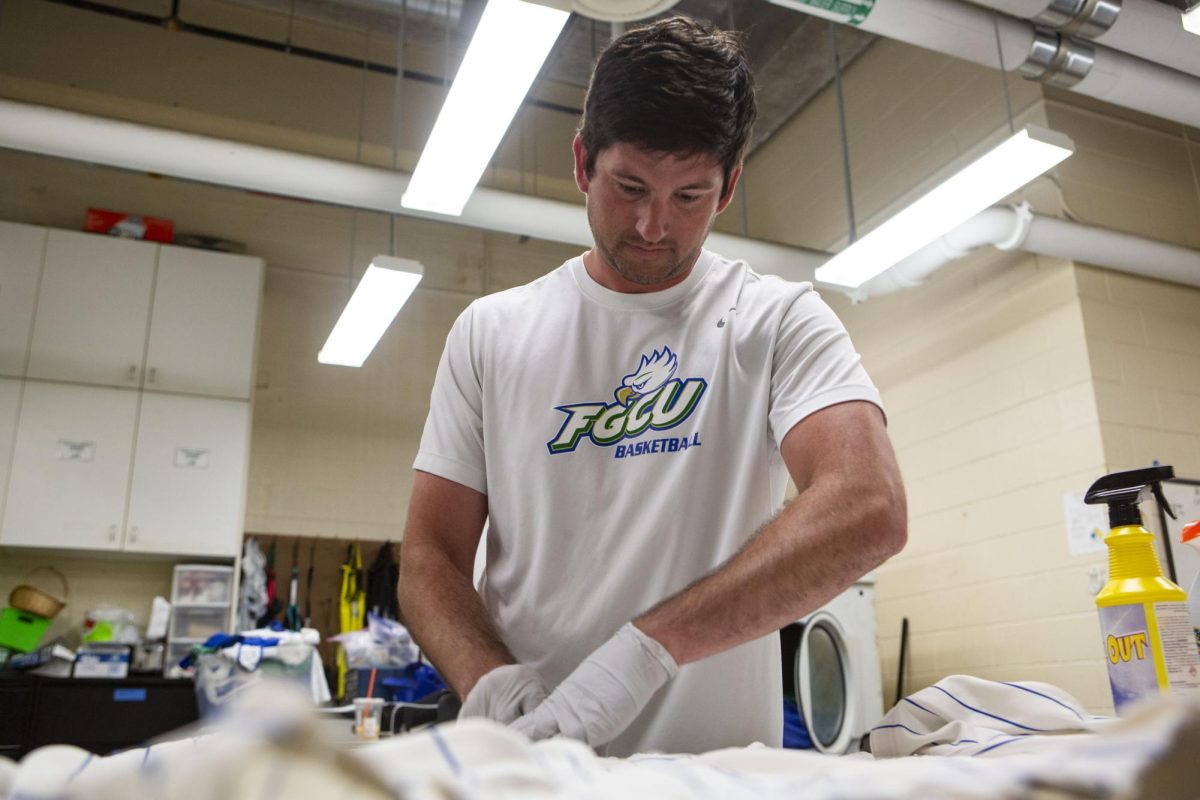With increased controversy surrounding the recent ruling to lift the two-decade-old ban on bear hunting in June, the FGCU Wings of Hope program — with assistance from the Physical Plant, FGCU Housing and the Florida Fish and Wildlife Commission — is taking action to turn FGCU into the state’s first-ever, bear-proof campus.
“We’re developing so much around the university, and it’s going to be taking more resources away from our wildlife,” said Ricky Piers, the FGCU Wings of Hope Panther posse program director, referring to the impending construction of the road from South Village Loop to Ben Hill Griffin Boulevard. “When that happens, they come looking for food. We want to do it now and get a head start on this problem.”

Pires — along with running the Wings of Hope panther-focused program, Panther Posse — spent her summer working on extending the bear-specific program to University of Central Florida with a program called The Bear Brigade.
Wings of Hope’s effort to bear-proof campus will primarily focus on the garbage containers in South Village — due to its location enclosed within wooded areas — as well as North Lake.
“It’s going to take some time and a lot of work, but we’ll be the first bear-proof university in Florida,” Pires said.
Last week, Yukon College’s Ayamdigut campus in Whitehorse, Canada announced that it would begin to take steps to becoming a bear-proof campus after having six human/bear incidents in the past eight years.
There are three things required to make a community bear proof: an educational program about living with bears, a response plan and bear-proof garbage containers throughout the community. Pires is currently working with housing to develop an educational program about living with bears, and a response policy that already exists is being updated.
Joe McDonald, the vice president of Business Services at FGCU, is in charge of figuring out how much financial assistance the project will need and out of what departments the finances will come from.
“The price options to implement changes are currently being reviewed,” McDonald said. “We have to go through each director of each department to find out what the financial impact of this will be and figure out our plan of attack in addressing that problem.”
Due to being only a few weeks away from the start of classes, the project might not come to fruition until sometime during the fall semester.
“FWC is very excited to partner up with FGCU on making it the first bear-proof campus in Florida,” said Casey Gray, an FWC Bear Biologist. “It is a big effort to get the entire community on board to become bear-wise, which I think is why this has never happened before. This is a really good thing that could be a great example for other communities.”
Pires hopes to encourage the surrounding Miromar properties to join in the efforts.

FWC says garbage is the biggest bear attractant in Florida. Because Florida Black Bears can smell food up to a mile away, they may associate people with food when finding their dinner in uneaten, discarded food and easy-access garbage cans. With the new garbage bins on campus, bears — along with other wildlife — will not be able to forage through it.
“Bears are not the problem,” Pires said. “It’s us. [The bears] know where the food is. We want to keep them wild and off [developed] campus. If there’s no food there, they won’t come.”
If you encounter a bear at close range:
- Remain standing upright
- Speak to the bear in a calm, assertive voice
- Back up slowly toward a secure area, and be sure you are leaving the bear a clear escape route
- Avoid direct eye contact; bears and other animals may view this as aggressive behavior
- Stop and hold your ground if your movement away seems to irritate instead of calm the bear
DO NOT:
- Make any sudden or abrupt movements
- Run — – running can trigger a chase instinct, and bears can sprint up to 35 mph
- Play dead — – black bears are not deterred from eating things if they are (seemingly or not) deadeat things that play dead or are dead
- Climb a tree — – black bears can climb 100 feet up a tree in 30 seconds
If a bear is threatening the safety of humans, pets or livestock, or causing property damage, contact FWC.


































